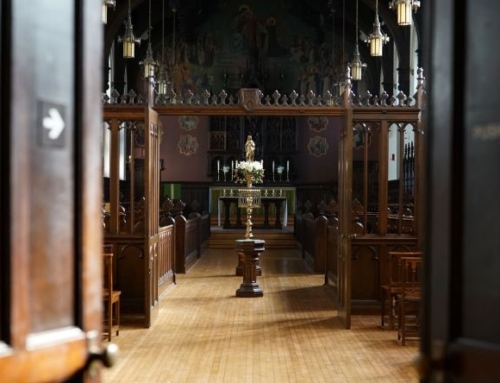Late Friday afternoon I was reading the news, and one item in particular got me very angry. It got me angry because of the injustice of it. Of course, some injustices, like abortion, are so common that we carry them with us all the time, but this one was unusual; and it struck a real nerve in me.
A black cloud settled over the rest of the evening. There was nothing I could do, really, except pray about the incident, for the people involved, etc. Now prayer is a powerful thing (cf. Matthew 17:20), but I was still angry. Later that night, during a community social gathering, I asked some of my brothers where St. Thomas Aquinas speaks of anger in the Summa. Briefly, I explained what had angered me, and we talked about the Gospel story in which Jesus casts the money changers out of the Temple, about how he gets angry and flips over their tables—the very same passage that was read this Sunday at Mass (John 2:13–22). It was suggested that I look at what St. Thomas says about this passage in his Commentary on John’s Gospel.
In the story, our Lord says, “Take these out of here, and stop making my Father’s house a marketplace.” Then his disciples recall the words of Scripture, “Zeal for your house will consume me.” In other words, Jesus got really mad. Yes, God got angry—angry to the point of flipping over tables and brandishing a whip. He was like the cops crashing an illegal party, or an enraged parent sending everyone home and you upstairs to your room. Think about that for a moment. The Creator of the world, who had just performed his first public miracle a few verses earlier, is now full of righteous wrath.
So what do we make of our Lord’s anger? Well, let’s see what St. Thomas has to say:
“Zeal for your house consumes me.” Here we should remark that zeal, properly speaking, signifies an intensity of love, whereby the one who loves intensely does not tolerate anything which is repugnant to his love. …Thus, properly speaking, one is said to have zeal for God who cannot patiently endure anything contrary to the honor of God, whom he loves above all else… Now we should love the house of the Lord, according to the Psalm (25:8), “O Lord, I have loved the beauty of your house.” Indeed, we should love it so much that our zeal consumes us, so that if we notice anything amiss being done, we should try to eliminate it, no matter how dear to us those who are doing it are; nor should we fear any evils that we might have to endure as a result. So the Gloss says: “Good zeal is a fervor of spirit, by which, scorning the fear of death, one is on fire for the defense of the truth. He is consumed by it who takes steps to correct any perversity he sees; and if he cannot, he tolerates it with sadness.”
As a Catholic Christian, I was driven to anger by love—love for the sweetness of God, the beauty of the truth, and the grace of the Sacraments (especially Confession). The news item was a violation of love, of beauty, of truth. The enemy was chewing up the innocent and spitting them out, and that made me angry. I could not patiently endure the injustice I had read about, because it was contrary to the honor of God.
To the extent that our anger, like Christ’s, is driven by love for the honor of God—for goodness, beauty, and truth—it is nothing to be ashamed of. In fact, it can be an appropriate and holy zeal. Notice that our Lord did not actually harm anyone. But he did get angry. He got angry because of his love, and his love drove him to act. May God fill us with the same love. May God fill us with the same holy anger. May God help us to fight the good fight!
✠
Image: Giotto, Jesus Expels the Money Changers from the Temple







